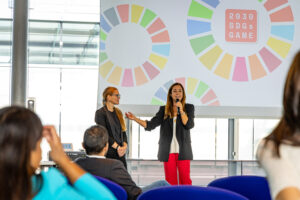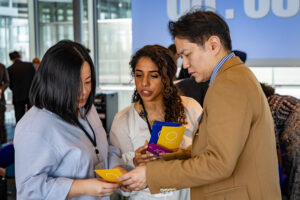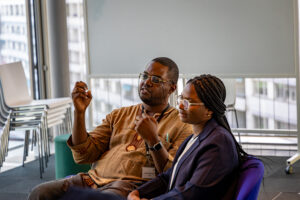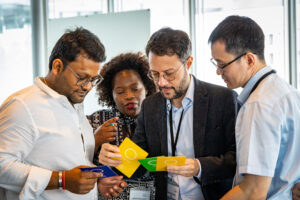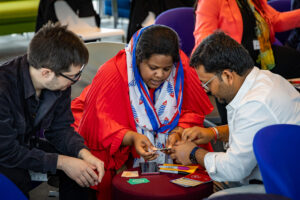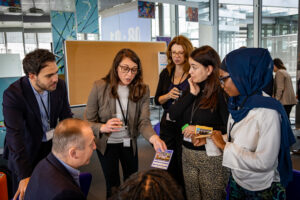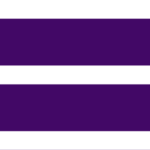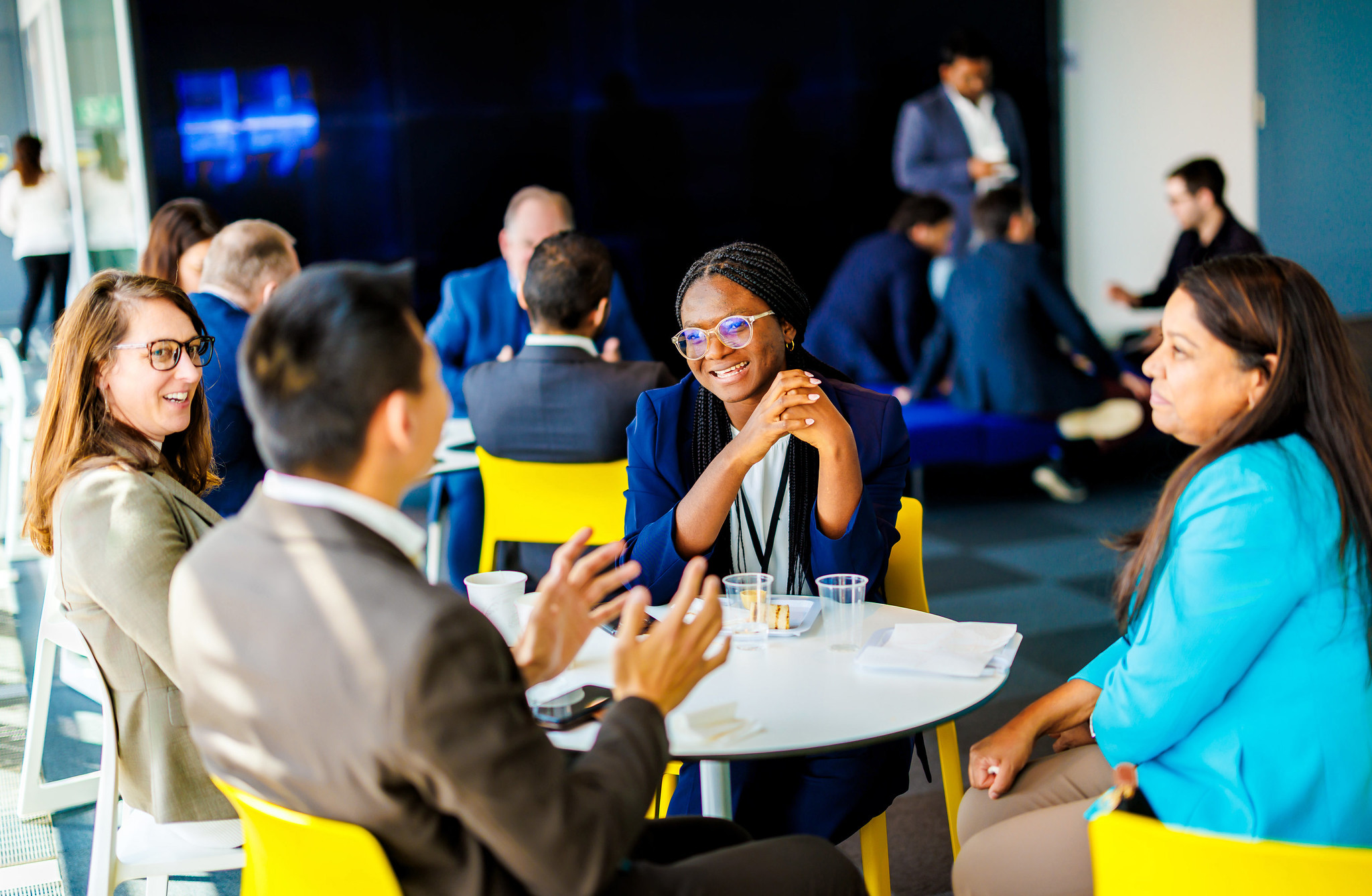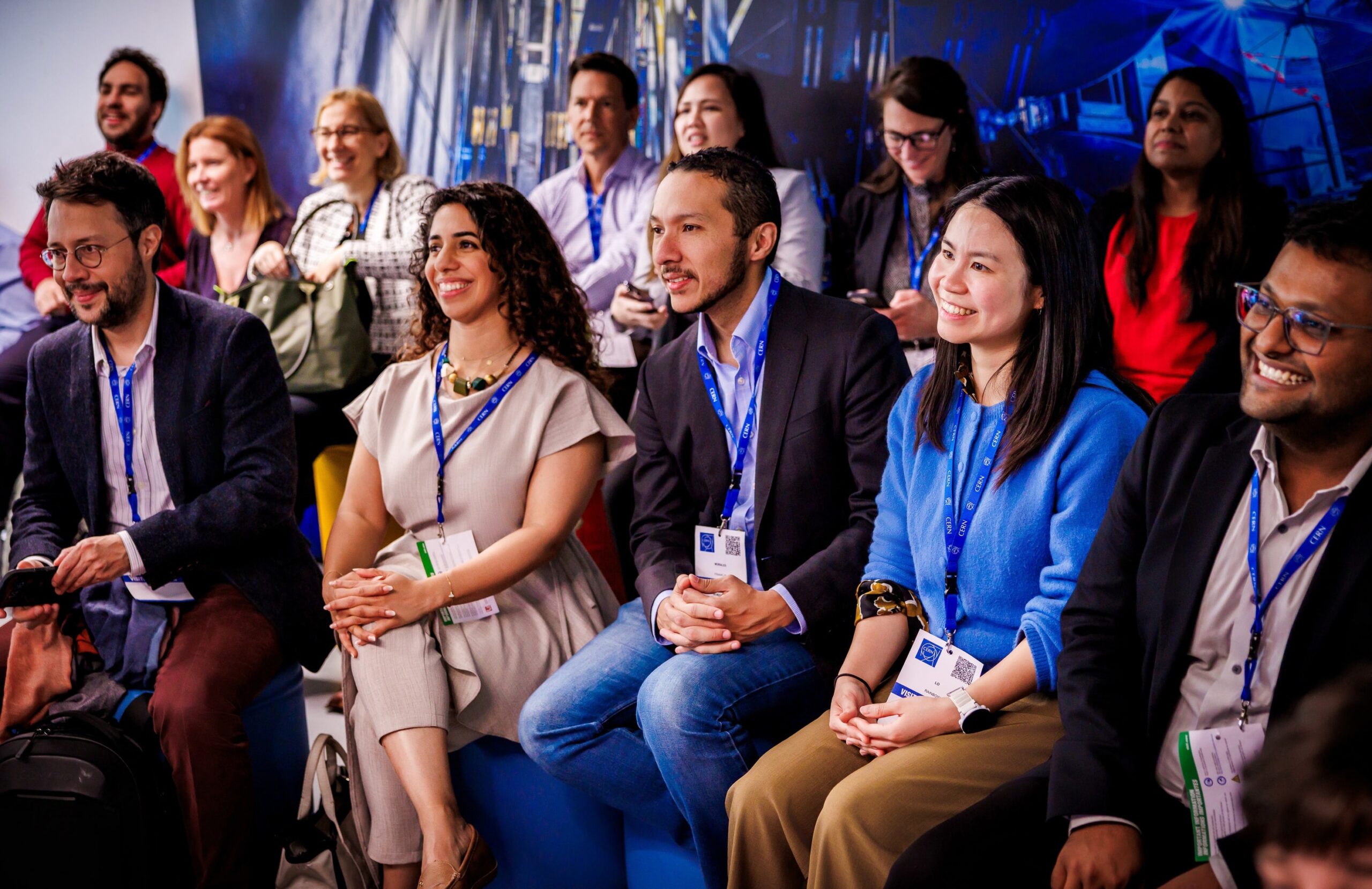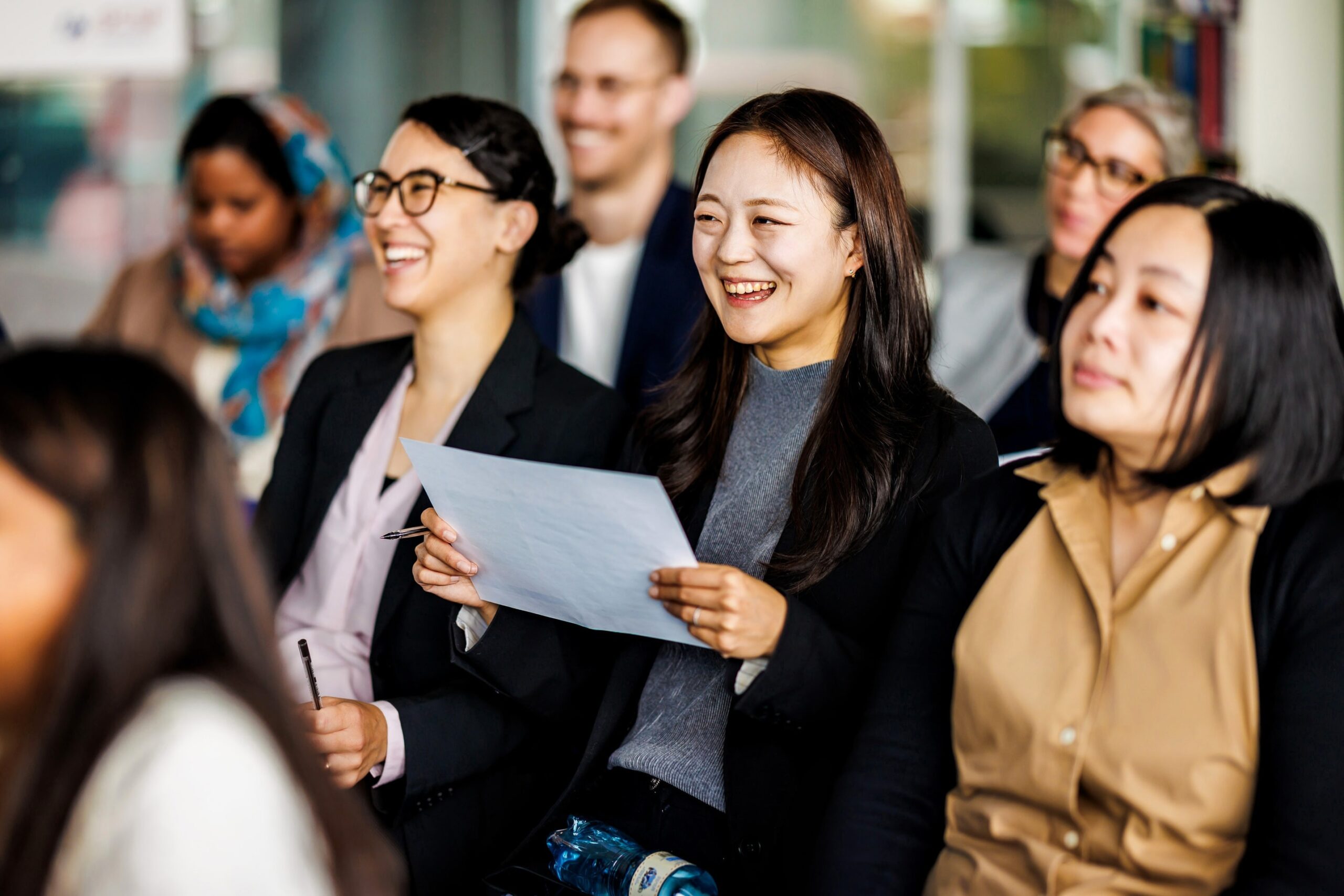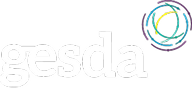On the final day, the cohort huddled at Campus Biotech, where GESDA is headquartered, for wrap-up sessions including the 2030 Sustainable Development Goals game, a keynote talk, and the awards ceremony.
On the way to their ‘kizuki’ moment about how to achieve the mutual benefits and opportunities of global cooperation, participants navigated the nuances of a simulation card game that is designed to illustrate the tensions and competing interests that must be negotiated to achieve the UN’s 17 Sustainable Development Goals (SDGs) for 2030 – and that encapsulates everything they learned during the weeklong immersion program in anticipatory science diplomacy. Breaking into teams, they traded projects that could benefit communities and nations but also have world-changing consequences for the economy, environment, and society.
Photos by Marc Bader/GESDA
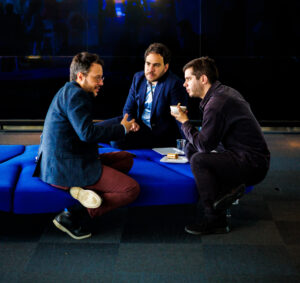
After the first round of the game, participants could see all of the results on a fictional ‘World Condition Meter.’ The economy was fairly strong, but the environment and society suffered. Despite some limited progress, the SDGs were not achieved. They regrouped to see if they could do better by 2040. Frenetic trading broke out. “Can I buy your time?” and “Are your principles for sale?” some said. “We don’t have enough money, we need money.” Others were overheard saying: “Guys, we need to implement this project to balance society” and “Can we get more time? No, not time. That’s our leverage. How about publicity?”
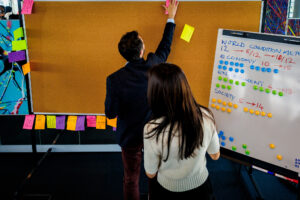
By the end of the exercise, the cohort ensured the economy was prospering, the environment was healing, and society was much more peaceful. Ten of the 12 teams achieved their goals. The SDGs were largely achieved, though some parts of the world were left behind and needed another decade of help. Asked to summarize their reactions, participants offered words like “energized,” “relieved,” “satisfied,” “hopeful,” “challenged,” “sacrificed,” “consoled,” “optimistic,” and “excited.” The game’s facilitator, Alice Richard, a professional trainer and coach with Co-CREATE ImpACT, said everyone reached their own “kizuki” or aha moment differently, realizing how the pursuit of individual goals affects the world and creative collaboration is needed to strike a balance.
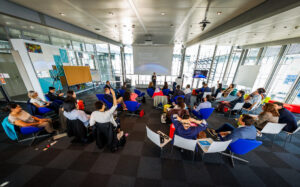
Reflecting on the latest geopolitical fragmentation and setbacks to multilateralism felt in Geneva, Sir Jeremy Farrar, Chief Scientist of the World Health Organization and a former GESDA Board member, offered a compelling assessment of today’s challenges and fielded some difficult questions. In a closing keynote talk that was by turns solemn and personal but ultimately emotional and uplifting, he encouraged participants to speak up and use their ability to make their voices heard, and to “stay optimistic” no matter what despite the trends against international cooperation, including global aid cuts. Even as he spoke, several members of the cohort were receiving concerning news about the topic on their smartphones. He pointed out that GESDA is working to ensure that science, technology and innovation will provide the maximum benefits that it can for the greatest possible number of people this century.
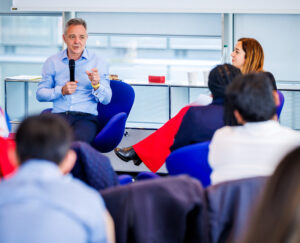
A lot has happened over the past year, he began, and that after an era of general consensus on a rules-based international order there has recently been an increase in questions about what sort of future we want, which is needed to overcome complacency. The upheaval will affect millions of lives. “Whatever the UN agencies and WHO are going to go through over the next six to nine months and then beyond, pales in comparison to the impacts within many countries around the world of this dramatic and sudden withdrawal of funding,” he said.
“But you have to believe that at times like that, and this will be for you to take the leadership – you have to accept that you cannot be passive,” he continued. “Because the world is asking fundamental questions about how it wants to be organized at the moment, and you cannot stand on the sidelines and say, ‘Somebody else will solve that.’ Because all of you in this room have some degree of agency and power. You may not feel it, but compared to 99% of the world, you have power and you have agency. And that’s the privilege of being here. But that comes with an enormous responsibility. And that’s the responsibility of sitting in these chairs – and the optimism that you can make a difference.” He pointed to the newly drafted global pandemic treaty as an example of multilateralism still functioning.
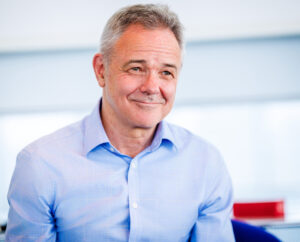
In April, WHO’s Intergovernmental Negotiating Body clinched a deal on a proposed treaty after more than three years of intensive negotiations. It was a rare instance in WHO’s 75-year history, Farrar noted, that something has been debated across all 194 member nations and governments were able to reach consensus on issues that have bedeviled the international community for decades, such as how to best share data and the benefits of advances in science and technology, and how to create more equitable access to medicines, vaccines, and treatments around the world. The proposal, which is meant to help countries better prevent and respond to global health crises, strengthen collaboration, and avoid the grave mistakes and widespread inequities of the COVID-19 pandemic, will go to the World Health Assembly for approval later this month.
“There are compromises; that’s diplomacy. But that surely tells you that the idea that multilateralism is dead has been grossly exaggerated,” said Farrar. “That actually the countries did want to continue to still work together, and are willing to take on some of the most vexed issues and try to find a solution. And if you want to leave this room today with some degree of hope that multilateralism is not yet dead and shouldn’t be, then surely the coming together on that to address a really difficult issue gives you some degree of optimism that actually this current shadow or dark period we’re going through doesn’t have to be the way.” Later, he emphasized the need to “trust yourself. You are where you are because of who you are. Don’t try to be somebody else. Be yourself. And trust yourself.” He received a warm standing ovation at the end of his talk and question-and-answer session.
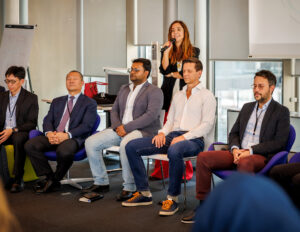
During a debriefing on the past week and a discussion of the next steps for building a community of anticipatory leaders, Marga Gual Soler, GESDA’s Head of Science diplomacy Capacity Building, began with a meditation. “Close your eyes, think about where you were when you first heard about anticipatory science diplomacy, about GESDA, and where you are today,” she instructed. The room fell silent. After they opened their eyes, participants described some of the realizations they had during the past week, such as a need to gain a certain level of competency at something to contribute to a solution; a sense of gratitude for the new opportunities that the GESDA program created; and an impetus to now take action and transform the group work into new initiatives.
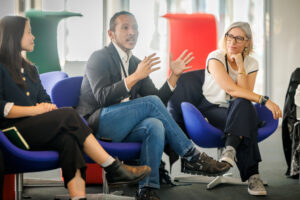
Some acknowledged a sense of skepticism when they began the week, but spoke of how that turned into a realization that science is knowledge, which can be turned into a powerful contribution to society. Others expressed feeling a new sense of agency and responsibility to keep pushing for progress, and called the past week an extraordinary, transformational experience allowing a diverse group of people to profoundly connect. One participant mulling the lessons of anticipatory science diplomacy from the past week described coming to a realization – akin to a “philosophy” or “a very powerful concept” – that some of the bigger problems in the world could perhaps be solved by first agreeing on some of the smaller things, then going from there.
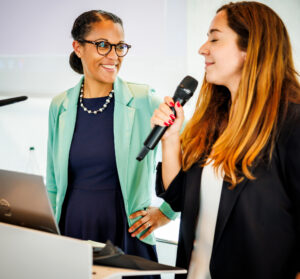
All of the graduates of Geneva Science Diplomacy Week 2025 “are now part of a family here, an extended family, and that includes the growing number of initiatives that GESDA has created,” said Marianne Schörling, a Senior Program Manager for GESDA who has been working on the Open Quantum Institute (OQI), GESDA’s most advanced initiative, since its incubation and launch.
Gual Soler, who oversaw the week’s curriculum and activities, called the cohort newly minted force multipliers and purveyors of a new speciality – anticipatory science diplomacy – that is creating a professional bridge. “You are all multipliers and hopefully you are all now convinced that we can pass this on through some organization or initiative as a force multiplier. We hope to mainstream this all around the world,” she said. “It’s really about that bridge that we at GESDA have created, and it’s about stepping on that bridge and crossing it. And you have each other, we have each other.”
Story by John Heilprin
Photos By Michael Chiribau/UNITAR
